Reading can reflect angles of a person’s mind

This enables us all, if we sharpen our information selection skills, to identify areas of interest, importance or knowledge gaps, and efficiently educate ourselves to widen our mindset, thoughts and absorb new fragments of information. With measured application of reflection, these fragments can be reconstituted in our minds and allow us to think more deeply and analytically about issues and solutions for ourselves, and for others in a societal or business context. A challenging question facing humanity is how time can be utilised with progressive increase in artificial intelligence, automation and robotics. I believe humanity could benefit from increased time to develop thinking beyond historical parameters and constraints through improved processes for reading and knowledge transfer.
To understand how norms have developed and to analyse how they will potentially be or should be shaped in a world where global thoughts and norms compete with a shifting state order, individuals and collectives can improve development through open minded research to further ideas and practical application
My reading list is not designed to be a superficial attempt to convince visitors that I am well read. Far from it. By reading more, we should understand more about how little we actually know and I include myself in this conundrum. My reading activities are constrained in the same way that many others face challenges to find time and space to read and absorb information amidst mundane tasks and more fulfilling family and friendship time. I wish to make clear that space constraints also limit my so-called reading list’s breadth and as with all lists there are many more omissions than inclusions. What I do hope by providing a reading list, is that visitors can appreciate that a professional, a lawyer and a dispute resolution minded person has reading and information interests that go beyond traditional linear texts and legal statutes. Sharing a reading list should also provide some thought provocation and maybe some assistance to those looking for inspiration.


The inclusion of books and articles is not an endorsement or appropriation of the ideas and contents created by the authors. If there are political, social and ideological opinions made, these are not my opinions, but I have read them in part or in whole and to the best of my ability remain objective and distanced from the contents. Some readings are clearly reflective of the politics of the authors, but not mine, and I have often chosen books to read that conflict or challenge popular beliefs and thoughts. Some of the ideas may be offensive to those that hold strong opposing views but I believe being offended and challenged in the right civilised context is important to ensure empathetic abilities are refined and that true sincere open mindedness is provided an optimum environment to flourish. One issue with this list is that it will remain static until it is updated and the world will continue to produce valuable information at a faster pace than any updates could ever be practically made. Some citations may stand the test of time, and others may be of interest to me and hopefully you – at the time of the inclusion.
Arbitration
A S Sweet & Florian Grisel The Evolution of International Arbitration: Judicialisation, Governance & Legitimacy (Oxford University Press 2017)
I found this book to be an excellent contextual analysis of arbitration’s evolutional progress framed by causal reference to the development of institutions, global orders, judicialization of arbitral processes but in a manner unique to arbitration, and a macro analysis of historical and modern themes of arbitration such as the role of institutions, the elitist nature of the top tier arbitrator pool, and interesting ideas for potential reform. In arbitration circles, common discussions of the value of hardening ‘precedent’ references and usage, tightly defining differences between common and civil law processes or embracing hybridisation, and the extent to which consensual principles can be widened to imply acceptance of arbitration including by states is referenced in this text.


U Draetta The Dark Side of Arbitration (Juris 2018)
This book is particularly rewarding as an enlightenment and validation on the unfortunate application of inappropriate behaviour which can negatively affect and influence judicial reasoning and outcomes depending on the strength of the misdemeanour. The author takes time to explain the situations that may occur that do not necessarily constitute a direct ethical violation under rules of law, but rather where behaviour can be criticised and seen to be unbecoming and simply ‘not doing the right thing’ in a situation. This can vary from exploitative, self-interest, attitude dysfunctionality through, to use the author’s direct description – stupidity. This is a good read for arbitrators seeking to improve themselves, understand and plan for the weaknesses of other participants in the arbitral process, and always be mindful that many are aware of the imperfections of arbitration. Arrogance, rudeness, unnecessarily manipulative acts and abuse of process at the fringes of the boundaries outlawed and accepted behaviour may be diminished through practitioner self-recognition and participant behaviour adjustment. There is a dark side to many situations and concepts, and it pays to expose the darkness to light and take action to reduce any negative impact or influence.
T Schulz Transnational Legality: Stateless Law and International Arbitration (Oxford University Press 2014)
This book provides a deep thinking deconstructon of the concept of law and its relationship with arbitration away from the usual text parameters which generally constrain topics to ‘investor-state’ ‘international commercial’ and ‘arbitral process and practice’ style distinctions. Instead, this book looks carefully at why law matters at all and when it might not matter, what kind of ‘system’ analysis can be applied to arbitration and to what extent this can be self-contained leading to further discussions on ‘stateless’ arbitration which is hotly discussed within and outside academia often described as ‘delocalisation’ of arbitration from national laws. The book also addresses the influence of ‘secondarisation’ of ‘primary rules’ into secondary rules which regulate the primary rules. This area of philosophical jurisprudence is helpful to consider when ordering principles, rules, regulations and their meaning and purpose which can be valuable for positivist and pluralist minded legal professionals alike. A favourite section of mine is that which discusses reasoned decisions and legitimacy, including a quote from Fuller in Morality “How can anybody follow a rule that nobody can understand”.


J Paulsson The Idea of Arbitration (Oxford University Press 2013)
This famous text deconstructs many of the superficial assumptive elements of arbitration and provocatively challenges thought governing arbitral processes and its foundatioins. For example, whereas in a traditional texts, the matter of “Kompetenz-Kompetenz” is almost uniformly described, in Paulsson’s book there is an explanation of the controversies of challenges to jurisdiction. Paulsson does not shy away from the aspects of arbitration that require attention and improvement: the manner in which some arbitrators have reportedly applied or misapplied law, varieties of interpretation of the ‘public policy exception’ and the ethical weakspots that either exist, or do not but are exploited by participants for self-interest and gain. Paulsson also addressed the wider issue of how arbitration can be self-regulated and to what extent, and ensuring that the importance of legitimacy of the process is preserved for the benefit of the users who ultimately must be served by the arbitral process managers and administrators.
T Schulz The Ethos of Arbitration
King’s College London Dickson Poon School of Law Legal Studies Research Paper Series: Paper No. 2019-23 available at https://ssrn.com/abstract=3405288
This paper provides a challenging insight on the lens of expectation and cognitive bias which affects the arbitrator selection pool and sheds light on how arbitrators make decisions. The ethos of arbitration can be politicised to an extent that may damage the arbitration industry, and self-interest may also endanger the legitimacy and function of decision making and the justification process. The extent to which behavioural economics determines or influences arbitrators and the value of recognition of its input is placed into the challenge of the general make-up of the arbitrator pool. If arbitrators are not reflective of the experiences and ethos of the community they serve, then there will inevitably be a widening disparity between the meaning and intention of justice dispensed, and justice received. The importance of people cannot be overlooked or ignored when people are making decisions, and a belief that these decisions can somehow absolutely be disconnected from their persona is dangerously narrow.


G A Bermann International Arbitration and Private International Law (Pocketbooks of the Hague Academy of International Law 2017)
This comprehensive book applies an extra level of analysis to the basic texts of international arbitration. It provides a deep insight to what the author describes as a “mutual prism” between international arbitration and private international law. Each section goes provides additional insight on classical arbitral theory and practice concepts, and references leading sources and divergence of opinions with commentary. When searching for a view of the issues within areas such as choice of law, annulment of awards, enforcement and interplay with powers of courts in national systems, this book is invaluable.
Economics and Sociology
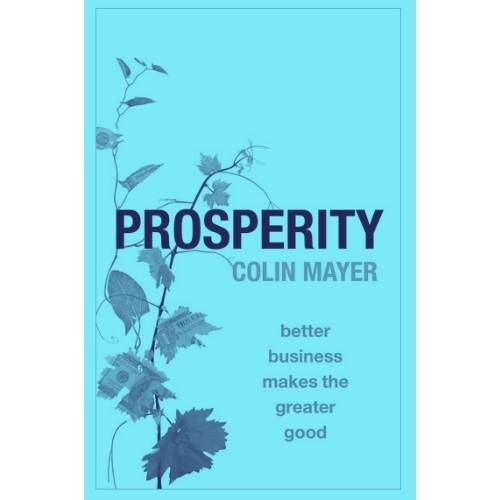
Colin Mayer Prosperity: Better Business Makes the Greater Good (Oxford 2018)
Colin Mayer managed to expertly condense the history of the purpose and activities of corporations into a small enough piece so that the remainder of his book devotes analysis to reframing the purpose of a company by reference to how law and society actually works. Even though it is well documented that there are varieties of capitalism, varieties of corporate forms and shareholding structures, patterns of ownership ranging from dispersed to concentrated, Mayer finds a common thread of stated purpose and measurable objectives beyond profit as the potential unifying methodology to improve the social and living environment we occupy. Mayer uses excellent biological and scientific analogies in the early parts of the book, and goes on to apply his theory to critical concepts of corporations and law – regulation, finance, corporate governance and investment. Mayer is immensely knowledgeable in all of these areas and is therefore able to succinctly capture complicated concepts and distill them into cohesive and thought provoking sections for which any business manager, employee or stakeholder would find enlightening. This type of thinking does fly in the face of traditionalist Friedman followers but provides reasoned arguments throughout.
R J Shiller Narrative Economics: How Stories Go Viral & Drive Major Economic Events (Princeton 2019)
Shiller’s works cannot be justly encapsulated in a mini-commentary on my website. However, it would be remiss I feel not to include at least one book as a testament to his contribution to progressive thought-provoking economic debate. Shiller neatly advocates within the context of behavioural economics and the irrationality of people, markets and political frameworks, that a narrative can be a catalyst for decades of economic outcomes in a particular direction. Shiller provides multiple examples of such narratives – the bitcoin experiment, deference to the ‘gold standard’, artificial intelligence labour replacement theories to name a few. For each example, Shiller neatly encapsulates the myths and irrationality by reference to how a narrative can be driven, citing measurements of usage of language and articles in a statistical framework. The most striking aspect of this book is its Pre-COVID19 references throughout to the contagion and epidemic-like nature of viral information which can cause significant positive and negative economic impact. Shiller’s so-called ‘school of thought’ is often challenged by scholars and commentators with the overall view that behaviour and narratives does not influence economics as much as is thought, and that overall there are market adjustments which adequately take into account anomalies resulting in a more certain economic landscape. Eugene Fama’s works are a good contrast to the works of Shiller.
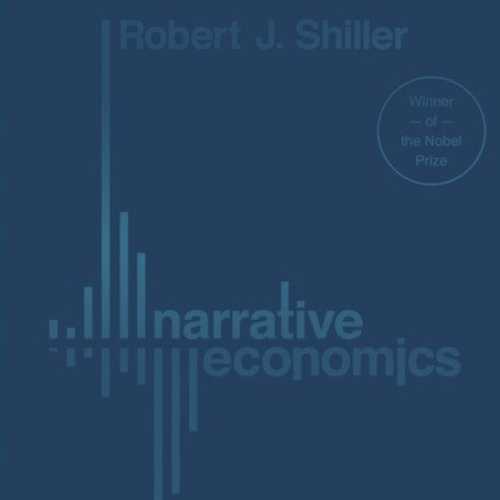
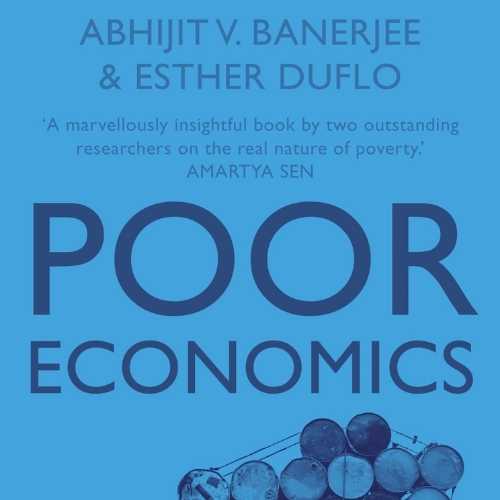
A V Banerjee & E Duflo Poor Economics: A Radical Rethinking of the Way to Fight Global Poverty (Public Affairs 2011)
The authors’ credentials speak for themselves. Their research and insight into the issues which the poorest parts of society have to deal with and common misconceptions on causes and solutions are enlightening to say the least. The examples of surveys into how the poor face decisions that relate to incredibly small sums of money by comparison to the rest of the world, are pertinent and provocative. For example, if an impoverished family suffer general ill health but medical costs to eliminate or assist are out of reach over time, then the purchase of a television representing a large percentage of income, to enliven life, may be perceived differently to the often mistaken presumption that ‘poor people make bad decisions’. Poor people just make different decisions, based on their circumstances, education and opportunity, which cannot be directly substituted by those that cannot understand how to manage life on less than 1 USD per day. This book provides excellent insight into the debates on whether assistance should be ‘free’, priced below market values or conditioned with other social engineering incentives. The authors discuss the benefits and disadvantages of microfinance, the issue of employee absenteeism in medical facilities, and why there is still an issue with sanitation, clean water and sufficient food supplies. As per the heading of the last chapter, there are no ‘sweeping conclusions’ to the issues in this book, but plenty of insight into the issues and learning from the mistakes of misguided historical policies to combat poverty.
Capital in the Twenty-First Century Thomas Piketty (Belknap Harvard 2017)
This book has also inspired many well written critiques of the conclusions and presentation of the information within it, and I have listed just one of those below. However, this book’s weight of information on the development of capital, the undeniable existence of inequality whether or not it is agreed that this has ‘relatively improved’ over time, combined with rigorous historical reference and transparency on weaknesses and challenges in metrics provides a perhaps unrivalled body of information which will be discussed repeatedly from different perspectives for decades to come. The author challenges readers into questioning the alleged capture of capital by the top tier of society and provides thoughts on progressive wealth redistribution policies. This is of course offensive to the principles of those that see the unequal distribution of wealth as evidence of success of innovators and risk takers driving the economy from ‘the top’. The book is thought provoking, a long read, and requires contemplation and some reflection after each section, but the effort is rewarded.

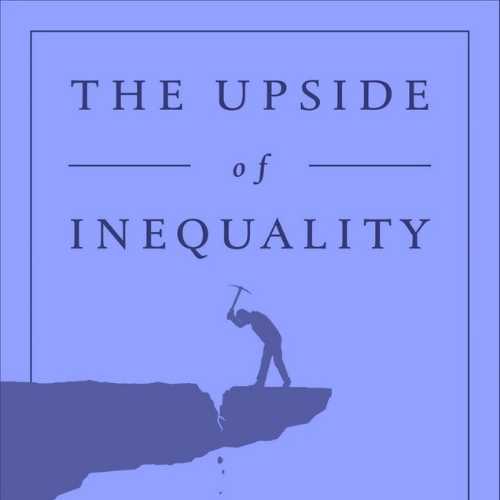
E Conrad The Upside of Inequality: How Good Intentions Undermine the Middle Class (Penguin Random House 2016)
The author sets out, mostly from an American economics perspective, a set of arguments to counter the wealth redistribution advocates by reference to the value of risk taking, the incentivisation of innovation and the relativity of wealth in the 0.1% to the progressive wealth over time of the remaining populous. Conrad also deconstructs in his terms, the measurement of wealth and references consumption and material gain as an indicator of overall societal development. He puts forward cases to justify high levels of wages for creators and CEOs, and provides illustrations of the alternative scenarios which might apply if wealth redistribution is applied. He further provides an argument that the impact of wealth distribution would be minimal relative to alternative policies to adjust economic and social development. This book is a good antidote to the dangers of embracing populism and morally obvious virtuous notions which may nor may not work when applied to the world as we know it. Whilst this book operates at the other end of the ‘spectrum’ to Piketty’s writings, there is value in analysing both views and views in between to understand the strengths and weaknesses of a debate that has no real conclusion.
C Murray Coming Apart: The State of White America, 1960-2010 (Crown Forum 2012)
This work is also criticised in part in the Upside of Inequality. However, the author sets out a compelling descriptive and analytical argument that the polarisation and hardening of class differences and values in America are exacerbated through pockets of elites throughout the world marrying within their socio-economic and educated tight circles which generationally widens gaps and highlights the lower chances of so-called ‘success’ in the middle and working class segments of society. The comparison of the fictional Belmont and Fishtown and the families that occupy it are striking. The author also provides for Americans and non-Americans a reminder or lesson on the economic and social value of the founding virtues, and advocates the stronger the values manifest themselves, the greater the chance of better economic and social outcomes, including religion whether or not it is devoutly followed or sincerely believed in. Non-White America is not omitted from the analysis, and the title can be misleading in that regard, but the point of the title is illustrated when the analysis is extended beyond ‘white America’ later on in the book.


J Bakan The Corporation: The Pathological Pursuit of Profit and Power (Free Press 2005)
I found this book to be an excellent starting point for the exploration of the extent and manner in which social responsibility may be interwoven into corporations which in modern times dominate economics and society. The book focuses on the negative and infamous incidents under which corporations have escaped accountability for human suffering and highlights the evil that pure greed without consideration for wider impact of actions can cause. The contents are also a good starting point for consideration of corporate governance policies and the extent to which corporate social responsibility, environmental social governance and similar policies are fundamental to overall society wellbeing and development. There is, as with all such provocative works, a differing school of thought on how to deal with the ‘problems’ of faceless corporations. Milton Friedman and advocates of relatively unconstrained markets with specific separate laws designed to deal with issues caused or connected to them, have published many works which can provide a different perspective to Bakan, but for which I have not devoted space to here due to obvious constraints.
K Pistor The Code of Capital: How Law Creates Wealth and Inequality (Princeton 2019)
From my perspective as a lawyer, this book deconstructs in a structured and referenced manner, the actions and policies of lawyers and their input into society which drives the issues linked to inequality. There is a chapter by chapter analysis of the issues that coding and shielding wealth through intellectual property laws, imbalanced property rights, the power imbalances in the decision making affecting the contents and direction of treaties, the use of complex structures to utilise debt increasing risk and consequences for a large segment of society arguably benefitting from the risks a much lower and disproportionate level than the deal makers and debt financiers. The book is a timely reminder that the design of law and its user and manipulators is not necessarily structured to make ‘everyone equal before the law’, especially when the pool of high achieving lawyers, their abilities and expense are not accessible to all for obvious economic reasons. The final chapter of this book also provides a pros and cons analysis of technology’s impact into managing how law is coded, and advocates for a balance between use and implementation and regulation to prevent likely abuse of smart contracts, cryptocurrencies and blockchain technologies.

Philosophy and Ethics
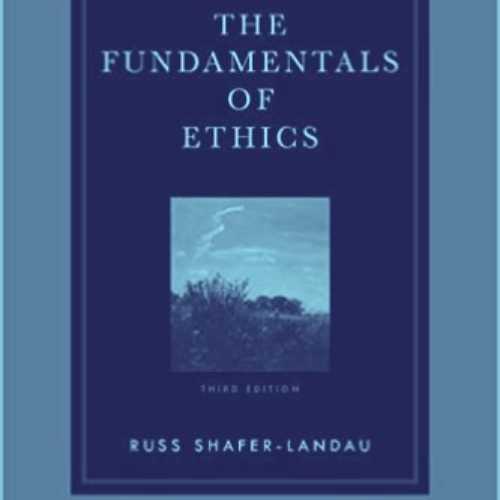
R Shafer-Landau The Fundamentals of Ethics (Oxford University Press 2018)
The author delivers a very clear and neutrally analytical overview of the wide ranging theories of ethics which can be used to shape societal development and policies, comparing historical ethics to modern ethics and providing the rational and difficulties of normative ethics; natural law; consequentialism, ethical egoism, the social contract traditions and ethical relativism amongst others. If not only to ensure there is appreciation that ethics is a complex, shifting and relative non-universal concept, this book is essential. Legal and philosophical analysis of policy, rule-making and sanctions is inextricably linked to varieties of ethical theories, prevailing ethics at a point in time in the relevant part of society, and therefore a misunderstanding of or absence of ethics can be critically damaging. The book is also structured as something that can easily be re-read, or referred to quickly as a source of reference for exploring one or more of the theories more deeply.
G Teubner Constitutional Fragments: Societal Constitutionalism and Globalization (Oxford University Press 2012)
In order to structure tools and policies based on theories and analysis of constitutionalism, and to reorder and organise these to fit into the systems and balance between state and private orders, a new understanding of how the fragments of power, law, institutionalism and friction may be connected and regulated is necessary. Teubner’s work is highly conceptual but grounded with references to worldly application in economies and society. Teubner offers some readers a potential new way of thinking about the frameworks of constitutions, adjusting a mind to a new form of thought, to allow a new potential form of pertinent problem solving to global problems and issues.
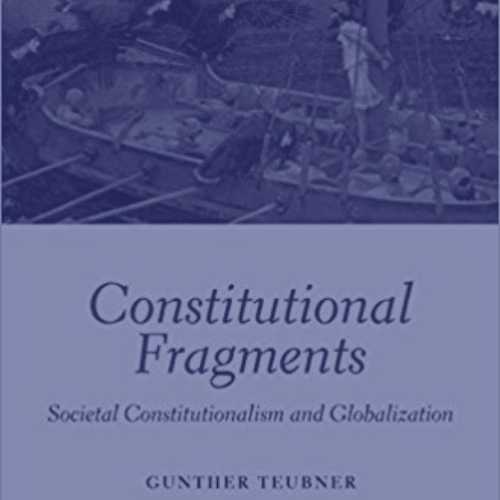
Corporate and Commercial Law
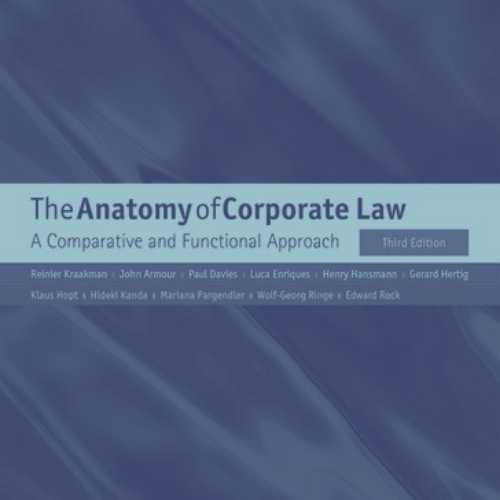
R Kraakman J Armour P Davies L Enriques H Hansmaan G Hertig K Hopt H Kanda M Pargendler W-G Ringe E Rock The Anatomy of Corporate Law: A Comparative and Functional Approach (Oxford 3rd Ed. 2017)
This was a leading text in the transnational corporate law-oriented module in my King’s College London LLM and justifiably so. I have referenced this book here because many of the challenges of legal practice in the corporate sphere are linked to the theories and issues analysed clearly and logically in this text. I have found that subsequent to absorbing this book, my feeling and perception from others on the quality of my legal work has improved significantly based on the extended studies arising from its contents. The book deals with the purpose of corporate law, agency problems, governance structures and issues, minority and majority shareholder tensions, creditor transactions and related party transactions. The authors vary from chapter to chapter and discuss issues relating to the balance of power and control in corporate organisations in a manner which allows great understanding of existing law, but also how law could be shaped in the future to address shifting planes of politics, economics and society.
R Goode The Development of Transnational Commercial Law: Policies and Problems (Oxford 2018)
This book is a selection of essays structured into Parts covering Harmonisation, Private and Public International Law, Usage and Lex Mercatoria and Dispute Resolution. The essays provide an excellent insight into the prevailing historical issues in each segment, and also provide challenging ideas on the potential direction and reform of law to solve classical legal and commercial problems. Almost all commercial topics are covered one way or another in these texts, which are an invaluable resource to remind the reader of the overriding policies and principles governing a particular area of law or business.
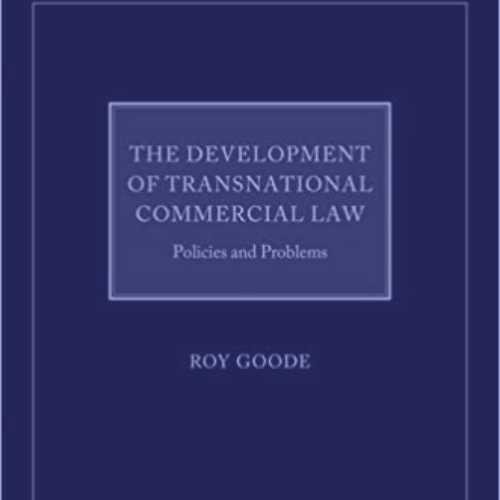
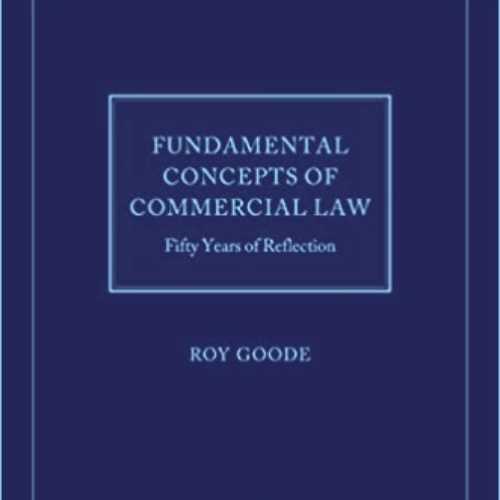
R Goode Fundamentals Concepts of Commercial Law: Fifty Years of Reflection (Oxford 2018)
Essential reading for anyone looking for exceptionally astute insight into areas of commercial law which have challenged lawyers, judicial decision makers and policy makers alike from principles of unjust enrichment, the issues with the “floating charge” security in English law, to the oft debated creeping codification of commercial law. This is both a student and experienced practitioner’s tool which can be referenced regularly for its high level and wide ranging coverage of both controversially debated and commonly accepted issues of commercial law.